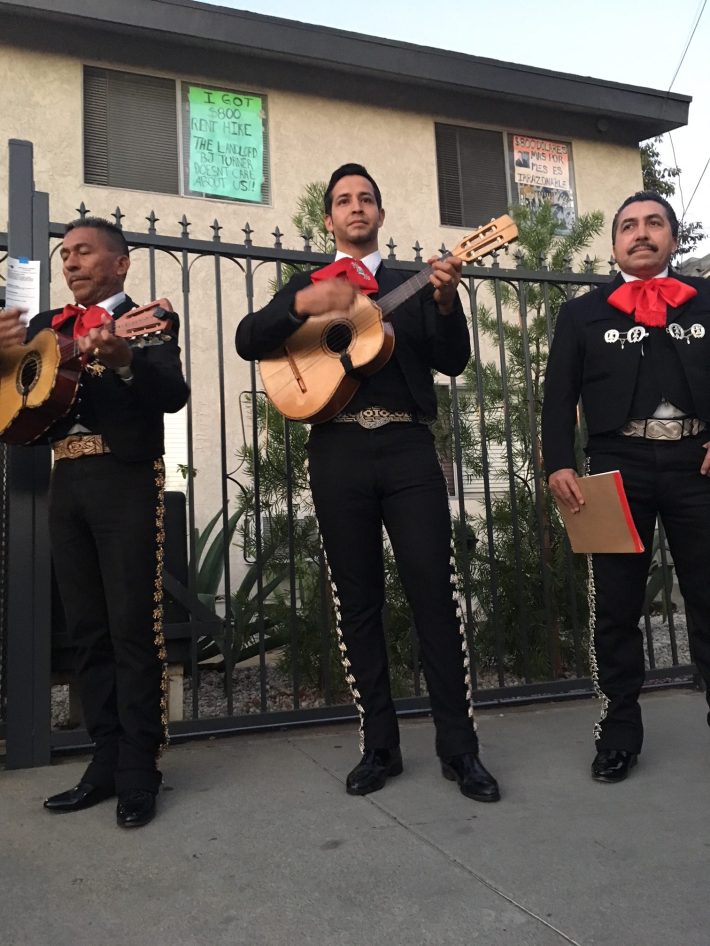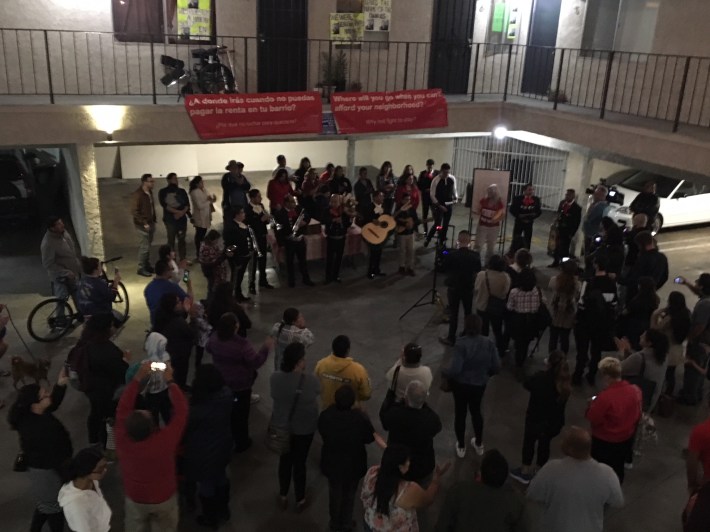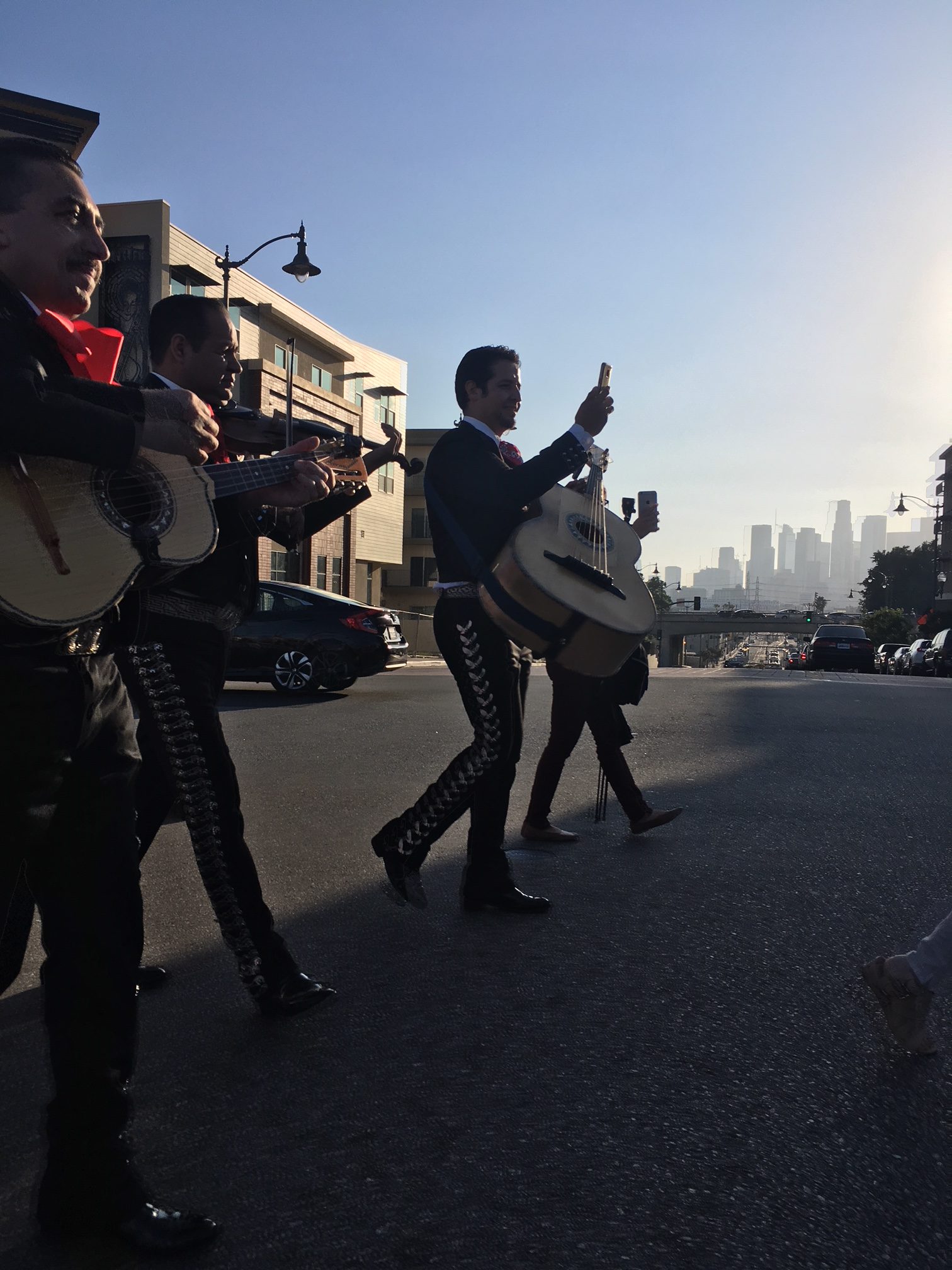One afternoon in January of last year, Luis Valdivia opened a letter from his new landlord with the worst nightmare for an L.A. renter: a monthly rent increase of $800.
Luis and his younger brother Enrique are mariachis who have shared a Boyle Heights apartment for the past 22 years. Their apartment building is located just a block from Mariachi Plaza, a gathering point since the 1930s for mariachis seeking work performing at private parties, restaurants, and public events.
Luis calls the plaza “headquarters,” and says that had the amount of the rent increase stood, he and his brother would have had to move away from the main source of their livelihood. “It was beyond our reach,” he said of the amount of the increase.
Representatives of the property owner, B.J. Turner, did not return phone calls seeking comment.
Mariachis occupy nearly a third of the 25 units in the apartment building, and they say living close to the plaza is essential to their livelihoods.
On Thursday, the mariachis and other tenants of the building announced the resolution of a year-long dispute with the property owner over rent increases of between 60 and 80 percent. Affordable housing advocates say the resolution is one of a kind, a multi-year collective bargaining agreement with the landlord that grants tenants rent control protections outside the limits prescribed by city law.
At a public celebration on Thursday evening, the Valdivia brothers performed in a band of nine mariachis in elegant black suits, playing a set of traditional Mexican folk songs and singing to a crowd of supporters.

Performing with them was Moises Hernández, another mariachi who rents an apartment in the building.
Hernández, 30, sang lead on Thursday evening when the band played the mariachi standard “Cielito Lindo,” whose famed chorus urges listeners, “canta y no llores,” or sing and don’t you cry. The song was an apt choice for Hernández, who has taken part regularly in protests, meetings, and legal consultations since the property’s owner raised his rent nearly 80 percent in January of last year.
The median rent for an apartment in Boyle Heights has risen by more than 40 percent in the past three years.
“It has been really difficult,” Hernández said. “A lot of time invested in fighting. The good thing is he listened to us, and in the end, we got what we wanted.”
The apparent cachet that mariachis have in Boyle Heights cast the dispute in symbolic terms of old-versus-new. The neighborhood has deep Mexican-American ties that go back a century. But like many areas of L.A., property values in Boyle Heights have been trending upward in recent years, aided by the area's Victorian-era architecture and desirable location on a bluff across the river from downtown's Arts District.
According to the real estate website Zillow, Boyle Heights ranked 11th in terms of rent increases among L.A. neighborhoods from January 2015 to May 2017. The median rent for an apartment in Boyle Heights has risen by more than 40 percent in the past three years.
A property management company in Culver City was advertising units in the building on Craigslist as 'affordable luxury apartments' and had christened the building 'Mariachi Crossing.'
“For all the people who say gentrification is inevitable, well, not today,” said Elizabeth Blaney, co-director of the LA Tenants Union, the group that has represented the tenants in the dispute. Blaney said tenants in 13 of the 25 units in the building have entered into the collective bargaining agreement. She called it unique in her 23 years of tenant organizing in Los Angeles. “In all the years I’ve been doing this, I’ve never seen something like this happen, not in LA,” she said.
Under the terms of the deal, the average rent increase was lowered to 14 percent in the first year, down from a previous average rent increase of 66 percent. The deal limits future rent increases to 5 percent a year over the next three-and-a-half years and pledges the landlord to make needed repairs.
And when the current deal expires, Turner has agreed to bargain in good faith for a new one with the LA Tenants Union.
“The contract says the landlord recognizes the tenants’ right to form a union and to bargain collectively with other members of the union for a new lease,” says Noah Grynberg, a staff attorney with the Los Angeles Center for Community Law & Action, an affordable housing group that defended the tenants in court.
'In solidarity with the others, we said they’re coming for us next, and we stood with our neighbors.'
Los Angeles City Councilmember José Huizar praised both parties to the deal in a written statement. “Just because you can increase rents, doesn’t mean you should,” Huizar said. “I joined our community activists in doing my part to put pressure on the property owner to meet with the residents to hear out their grievances and concerns. He deserves credit for doing that and listening.”

Apartment buildings built before 1978 are protected by L.A.'s rent-control ordinance, but the apartment building in dispute is exempt from the law’s protections since it was built in 1983.
Turner purchased the apartment building at 1815 E. 2nd Street in December 2016. A month later, tenants in six of the apartment units received notice of rent increases of between 60 and 80 percent. A real estate manager who represents Turner informed me in April that rents were increased after Turner made "significant improvements" to the property.
As LAist first reported in May, a property management company in Culver City was advertising units in the building on Craigslist as "affordable luxury apartments" and had christened the building "Mariachi Crossing."
Tenants like Francisco Gonzalez, who has lived in the building for 12 years, say they hope the union-bargaining and aggressive legal strategy in Boyle Heights serve as a model for renters elsewhere in the city faced with rent increases they consider exorbitant.
Tenants formed a union and refused to pay the increase. As Turned rebuffed their attempts to meet, the tenants posted a photograph of the landlord on handwritten placards they taped to their apartment windows. With the support of experienced community activists from groups like Unión de Vecinos, the LA Tenants Union and Defend Boyle Heights, the tenants organized protest rallies across the city.
In July, tenants of seven apartments who had not received notice of a rent increase went on rent strike in support of those who did. The number of apartment units involved in the landlord dispute nearly doubled, from seven to 13.
One of the rent strikers was José Jesús Sánchez, 67, a maintenance worker at an apartment complex who has lived in the building for 21 years.
“We knew they were going to evict us in groups,” Sánchez said. “In solidarity with the others, we said they’re coming for us next, and we stood with our neighbors.”
Sánchez said Turner refused to meet with tenants for months. The turning point, he said, came in December after supporters from LA Democratic Socialists of America camped out overnight on a strip of grass between the roadway and the sidewalk in front of Turner’s home.
“When the shoe was on the other foot, and the harassment started going in the opposite direction, that is what made him give in,” Sánchez said.
Tenants like Francisco Gonzalez, who has lived in the building for 12 years, say they hope the union-bargaining and aggressive legal strategy in Boyle Heights serve as a model for renters elsewhere in the city faced with rent increases they consider exorbitant.
“Hopefully this is a model for other buildings that don’t have rent control and they can follow the steps that we did over the last year,” he said.







